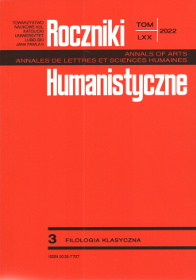Pojęcie dobra i zła w traktatach Corpus Hermeticum
Abstrakt
Corpus Hermeticum (CH) jest zbiorem siedemnastu greckich traktatów, których autorstwo przypisuje się legendarnemu Hermesowi Trismegistosowi. Chociaż zawarte w jednym zbiorze, pisma te nie stanowią jednorodnego i koherentnego systemu. Dlatego też trudno jednoznacznie odpowiedzieć na pytania, czym jest dobro i czym jest zło w Corpus Hermeticum. Pamiętając o tym, że niektóre z pism znajdujących się w Corpus Hermeticum mogą zawierać niekonsekwencje i odstępstwa od myśli, które można nazwać wspólnymi dla nurtu hermetycznego, analiza poszczególnych traktatów pozwala jednak na sformułowanie ogólnych wniosków odnoszących się do pojęć „dobro” i „zło”. W hermetyzmie więc najwyższy bóg jest bezwzględnym dobrem, świat – ponieważ jest materialny – nie może być dobry, ale nie jest także zły, skoro jest nieśmiertelny. Zły natomiast jest człowiek, a to z powodu swojej śmiertelności. Tym natomiast, co może uchronić człowieka przed złem, jest pobożność, która w myśli hermetycznej jest ściśle związana z poznaniem boga.
Bibliografia
Arystoteles. Etyka nikomachejska. Tłum. Daniela Gromska. Wydawnictwo Naukowe PWN, 2012.
Arystoteles. Metafizyka. Tłum. Kazimierz Leśniak. PWN, 1984.
Bos, Abraham P. Cosmic and Meta-Cosmic Theology in Aristotle’s Lost Dialogues. Brill, 1989.
Bull, Christian H. The Tradition of Hermes Trismegistus. The Egyptian Priestly Figure as a Teacher of Hellenized Wisdom. Brill, 2018.
Copenhaver, Brian P. The Greek Corpus Hermeticum and the Latin Asclepius in a New English Translation, with Notes and Introduction. Cambridge University Press, 1995.
Corpus Hermeticum, texte établi par Arthur Darby Nock, t. I-II, Les Belles Lettres, 1960.
Dictionary of Gnsosis and Western Esotericism, edited by Wouter J. Hanegraaff in collaboration with Antoine Faivre, Roelof van den Broek and Jean-Paul Brach, Brill, 2006.
Festugière, André-Jean. La Révélation d’Hermès Trismégiste, t. 1, Les Belles Lettres, 1945.
Festugière, André-Jean. La Révélation d’Hermès Trismégiste, t. 4, Les Belles Lettres, 1954.
Fowden, Garth. The Egyptian Hermes. A Historical Approach to the Late Pagan Mind. Princeton University Press, 1986.
Freke, Timothy, i Peter Gandy. Hermetica. The Lost Wisdom of the Pharaohs. TarcherPerigee, 2008.
Hermetica. The Ancient Greek and Latin Writings which Contain Religious or Philosophic Teachings Ascribed to Hermes Trismegistus, edited with English translation and notes by Walter Scott, vol. 1-2, Oxford at the Clarendon Press, 1924-1925.
Iamblichi De vita Pythagorica liber, edidit Ludovicus (Ludvig) Deubner, Teubner, 1937.
Kerchove, Anna van den. La voie d’Hermès. Pratiques rituelles et traités hermétiques. Brill, 2012.
Narecki, Krzysztof. „Słownik terminów arystotelesowych”. Arystoteles. Dzieła wszystkie, t. 7, Wydawnictwo Naukowe PWN, 1994.
Pacewicz, Artur. „Koncepcja Dobra (τἀγαθόν) w filozofii przedplatońskiej”. Studia Philosophica Wratislaviensiai, t. 1, nr 1 (2006), ss. 87-99.
Petersen, Tage. „Hermetic Dualism? CH VI against the Background of Nag Hammadi Dualistic Gnosticism”. The Nag Hammadi Texts in the History of Religions: Proceedings of the International Conference at the Royal Academy of Sciences and Letters in Copenhagen, September 19-24, 1995. On the Occasion of the 50th Anniversary of the Nag Hammadi Discovery, edited by Søren Giversen, Tage Petersen and Jørgen Podemann Sørensen, Det Kongelige Danske Videnskabernes Selskab, ss. 95-102.
Plato. Opera, edited by John Burnet, Oxford Classical Texts, Oxford University Press, 1961-1962.
Platon. Państwo. Tłum. Władysław Witwicki, Wydawnictwo Naukowe PWN, 2010.
Porreca, David. „How hidden was God? Revelation and pedagogy in ancient and medieval Hermetic writings”. Histories of the Hidden God. Concealment and Revelation in Western Gnostic, Esoteric, and Mystical Traditions, edited by April D. DeConick and Grant Adamson, Routledge, 2014, ss. 137-148.
Reitzenstein, Richard. Poimandres: Studien zur Griechisch-Ägyptischen und frühchristlichen Literatur. Teubner, 1904.
Rudolph, Kurt. Gnoza. Istota i historia późnoantycznej formacji religijnej. Tłum. Grzegorz Sowiński, Nomos, 2011.
Tylak, Aneta. Bóg – świat – człowiek w traktatach Corpus Hermeticum na tle greckiej tradycji filozoficznej. Wydawnictwo Uniwersytetu Łódzkiego, 2021.
Zieliński, Tadeusz. Hermes Trismegistos. Armoryka, 2017.
Zieliński, Tadeusz. „Hermes und die Hermetik”. Archiv für Religionswissenschaft, t. 9, 1905, ss. 321-372.
Copyright (c) 2022 Roczniki Humanistyczne

Utwór dostępny jest na licencji Creative Commons Uznanie autorstwa – Użycie niekomercyjne – Bez utworów zależnych 4.0 Międzynarodowe.





